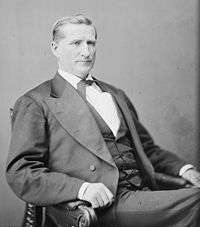John Goode
| John Goode, Jr. | |
|---|---|
|
John Goode, Jr. portrait, between 1865 and 1880 | |
| 3rd Solicitor General of the United States | |
|
In office May 1885 – August 1886 | |
| Appointed by | Grover Cleveland |
| Preceded by | Samuel F. Phillips |
| Succeeded by | George A. Jenks |
| Member of the U.S. House of Representatives from Virginia's 2nd district | |
|
In office March 4, 1875 – March 3, 1881 | |
| Preceded by | James H. Platt, Jr. |
| Succeeded by | John F. Dezendorf |
| Chairman of the Committee on Education and Labor | |
|
In office March 4, 1877 – March 3, 1881 | |
| Preceded by | Gilbert C. Walker |
| Succeeded by | Jonathan T. Updegraff |
| Member of the Virginia House of Delegates from Norfolk County | |
|
In office 1867 Alongside J. C. Langhorne, A. F. Leonard and Thomas Butt | |
| Member of the Confederate States House of Representatives from Virginia's 6th district | |
|
In office February 22, 1862 – March 18, 1865 | |
| Preceded by | Position established |
| Succeeded by | Position abolished |
| Member of the Virginia House of Delegates from Bedford County | |
|
In office 1852–1853 Alongside Samuel Davis | |
| Personal details | |
| Born |
May 27, 1829 Bedford County, Virginia |
| Died |
July 14, 1909 (aged 80) Norfolk, Virginia |
| Resting place |
Longwood Cemetery Bedford, Virginia |
| Political party | Democratic |
| Alma mater |
Emory and Henry College Washington and Lee University School of Law |
| Occupation | Politician, lawyer |
| Military service | |
| Allegiance | Confederate States of America |
| Service/branch | Confederate Army |
| Rank | Colonel |
| Unit | Jubal Early's Staff |
| Battles/wars | American Civil War |
- For the San Antonio, Texas, Republican lawyer, also known as John Goode, Jr., see John W. Goode.
John Goode, Jr. (May 27, 1829 – July 14, 1909), was a Virginia Democratic politician who served in the Confederate Congress during the American Civil War and then was a three-term postbellum United States Congressman. He was also the acting Solicitor General of the United States.
Biography
Goode was born in Bedford County, Virginia. He was graduated at Emory & Henry College in 1848, studied law at Washington and Lee University School of Law and was admitted to the bar in 1851. In the latter year he was elected a member of the Virginia House of Delegates, and in 1861 sat in the state convention that passed the Ordinance of Secession.
With the impending dissolution of the United States in 1861, Goode was elected to the Virginia secession convention. With the affirmative vote and Virginia's subsequent secession, Goode was elected to both the First Confederate Congress and the Second Confederate Congress, serving from February 22, 1862, until the end of the war, and during the recesses of that body acted as volunteer aide on the staff of Maj. Gen. Jubal A. Early.
After the war, Goode resumed his law practice and again served in the state House of Delegates in 1866 and 1867. Like many high-ranking ex-Confederates, Goode had his civil rights restored 9under the provisions of Section 3 of the Fourteenth Amendment. In 1887, Goode moved to Norfolk and engaged in the practice of the law in Washington, D.C. Shortly after he moved to Norfolk, he was again elected to the Virginia legislature.
He was then chosen to the Forty-fourth United States Congress as a Democrat. He was re-elected to the Forty-fifth United States Congress and the Forty-sixth United States Congress, serving from December 6, 1875, until March 3, 1881. He was Chairman of the Committee on Education and Labor during his last two terms.
Goode was a member of the Democratic National Conventions of 1868 and 1872, and was a presidential elector in 1852, 1856, and 1884.
In May 1885, President Grover Cleveland appointed Goode as the acting Solicitor General of the United States, and he retained the office until August 1886. During his term of service, he visited British Columbia to represent the United States in an extradition case.
He later served on the United States and Chilean Claims Commission and was President of the Virginia Bar Association. He also was President of the Virginia Constitutional Convention of 1901 and 1902.
Goode died at the age of 80 in Norfolk and was buried in Longwood Cemetery in Bedford, Virginia. (see http://files.usgwarchives.org/va/bedford/cemeteries/longwood.txt)
Electoral history
- 1874; Goode was elected to the U.S. House of Representatives defeating Republican James Henry Platt, Jr. and Independent Republican Robert Norton, winning 49.43% of the vote.
- 1876; Goode was re-elected defeating Republican Joseph Secar, winning 52.97% of the vote.
- 1878; Goode was re-elected defeating Republican John Frederick Dezendorf, winning 56.73% of the vote.
References
 This article incorporates public domain material from the Biographical Directory of the United States Congress website http://bioguide.congress.gov.
This article incorporates public domain material from the Biographical Directory of the United States Congress website http://bioguide.congress.gov. This article incorporates public domain material from websites or documents of the Office of the Solicitor General.
This article incorporates public domain material from websites or documents of the Office of the Solicitor General.
- Political graveyard
- United States Congress. "John Goode (id: G000277)". Biographical Directory of the United States Congress. Retrieved on 2009-04-21
| Legal offices | ||
|---|---|---|
| Preceded by Samuel F. Phillips |
Solicitor General of the United States 1885–1886 |
Succeeded by George A. Jenks |
| United States House of Representatives | ||
| Preceded by James H. Platt, Jr. |
Member of the U.S. House of Representatives from Virginia's 2nd congressional district 1875–1881 |
Succeeded by John F. Dezendorf |
| Political offices | ||
| Preceded by Gilbert C. Walker Virginia |
Chairman of House Education and Labor Committee 1887–1881 |
Succeeded by Jonathan T. Updegraff Ohio |


